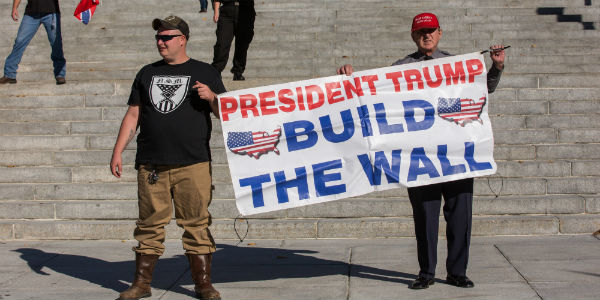Don’t be lulled by the promise of a Trump economic stimulus. The threat is to American democracy itself

Members of the neo-Nazi National Socialist Movement demonstrate in Harrisburg, Pennsylvania. Photo: Paul Weaver via a CC-BY-NC-SA 2.0 licence
First, Trump promises to deliver a significant fiscal stimulus through a combination of large infrastructure projects and tax cuts. That should directly boost growth in the short to medium term. If selected and implemented correctly, with full transparency and respect of the legal rules, projects that result in better transportation and communication infrastructure on a large scale would not only boost demand during construction but also have the capacity to increase productivity over the medium term. The economist Larry Summers has long argued that jump-starting infrastructure investment is the best way to counter post-crisis secular stagnation in a non-inflationary world.
Second, Trump will in all likelihood be able to obtain market finance for the stimulus. In this context, some monetary financing from the Fed may arguably help. It will generate some inflationary pressure, as employment is reaching capacity. But, in fact, this has been a persistent objective of central banks through quantitative easing – an aim that has not been successful.
Third, by easing the excessive burden laid on monetary policy to boost demand, the Fed may be able to normalise monetary policy faster and raise interest rates. The “policy mix” – the combination of monetary, fiscal and structural reforms policy – can finally become more balanced. Rising interest rates from ultra-low post-crisis levels will support small savers, pension funds and the insurance industry, easing pressures from low interest rates on them, thus helping financial stability.
Fourth, deregulation, another significant element of the emerging plan, can also have supply side effects, unless it ends up driven by vested interests. Given all these factors, no wonder markets have been enthusiastic.
Undermining democratic freedoms will put all this at risk
However, several issues could limit this potential growth generation – even in the short run. First, a rush to tear up free trade agreements would have a negative effect on growth as it would certainly generate uncertainty and create investment risks (though again protectionism could, on the short term, increase jobs through income substitution).
Second, if institutional checks and balances are weakened then vested interests, favouritism and corruption will thrive. These are the usual reasons why so many countries have produced wasteful “white elephant” or large scale investment projects that do not enhance productivity. It is against that sort of misallocation that safeguards needs to be established.
Third, it is not clear at this point how the emerging economic plan would sit with major sections of the Trump vote. Fiscal stimulus runs against conservative Republicans’ hatred of big government and high public debt. Republicans loath protectionism and the regulation coming along with it. And rising inequality, an inevitable consequence of the planned tax cuts, will hurt the poor and less educated, another key Trump constituency.
On the whole, Trump’s economic policy is quite clear. It is a kind of populism that can deliver higher growth on the short-to-medium term. And at this juncture of the post-crisis economic cycle, the suggested fiscal stimulus with supply side reforms is something that may actually be desirable to pull economies out of a post-crisis low-growth trap.
So the focus should not be economics. A much more serious threat could be on the horizon. What may have to be defended are the basic pillars of democracy. The real threat does not come on the economic front, but from the risk that the new administration may end up tampering with the institutions that provide the political and economic framework and ensure overall financial and political stability in America. Populists and autocrats tend to target fundamental democratic institutions from the outset – the independence of the judiciary, and the media. This is where the main concerns should lie.
Is this an exaggeration, in the world’s leading democracy? Sadly, it is not. We have seen recent successful efforts to extinguish media freedom and undermine judicial independence by democratically elected governments, not only in Russia, Turkey and Venezuela, but also in two EU members, Hungary and Poland (and the number may well grow further in the coming months). The EU’s mature legal framework has been unable to sufficiently counter these attacks on democratic institutions.
Everything rests on just a few key beacons of democracy: upholding human rights, individual freedom (including that of minorities), the right to trial and many other basic civil rights – all can be directly affected by these institutions. Similarly, the independence of economic and political institutions, particularly those promoting competition and transparency, needs to be defended. The erosion of democratic institutions is too big a risk to ignore, even if this risk is smaller in the US than elsewhere.
Vigilance and systematic monitoring of any emerging threat to key political and economic institutions in the US must be a priority at all levels of government: local, state and federal. This is the responsibility of the whole of society. It is also the responsibility not only of Democrats, but also those disenchanted voters who genuinely want a better and more inclusive system that pays attention to their plight. If they fail, institutions will be undermined and that would increase perceived risks and deter investment, hurting the growth plan.
Demagogic rhetoric poisoned Trump’s election campaign. It is still unclear how much bigotry, misogyny, white supremacy and racism he has unleashed in the process. The early signs are worrying.
We must hope that the basic tenets of American democracy will be upheld and protected from damaging political interference. But this cannot be left to chance – action and vigilance are needed now. America should therefore focus on the most dangerous political risks to key institutions, rather than on short term economic policy, and organise to defend what is really crucial. As for the economic package itself, it might well work – if growth trumps protectionism.
This post represents the views of the author and not those of Democratic Audit. It first appeared at the LSE USA Policy and Politics blog.
 Piroska Nagy Mohacsi is Programme Director in the Institute of Global Affairs at the London School of Economics. Previously she was Director at the Office of the Chief Economist of the European Bank for Reconstruction and Development (EBRD).
Piroska Nagy Mohacsi is Programme Director in the Institute of Global Affairs at the London School of Economics. Previously she was Director at the Office of the Chief Economist of the European Bank for Reconstruction and Development (EBRD).





 Democratic Audit's core funding is provided by the Joseph Rowntree Charitable Trust. Additional funding is provided by the London School of Economics.
Democratic Audit's core funding is provided by the Joseph Rowntree Charitable Trust. Additional funding is provided by the London School of Economics.
Don’t be lulled by promise of an economic stimulus. Threat is to American democracy itself https://t.co/DatGBotV7q threat 2 what US dmcy?
Don’t be lulled by the promise of a Trump economic stimulus. The threat is to American democracy itself https://t.co/xv7AYy2eC6
Firstly we can ignore ‘economists’ as some form of expert crystal ball gazers. Mystic Meg could have done better with her little ball over ‘Brexit’ when ‘economist experts’ told us that the very next quarter after the vote would show recession (‘unavoidable’)…and of course it didn’t happen. Nowhere near.
The real threats to democracy do not come necessarily from one side or the other. The EU itself has acted to suppress democracy on a grand scale, overturning elected heads of government (in Greece and Italy and installing its Goldman Scahs favourties to run the countries according to Eu diktat) and arrogantly ignoring the outcome of referrenda (the threats made to Greece and its leaders last summer will one day amaze those who read them, well not me) – but presumably this is alright because it’s the EU? Their threats are greater than those of the individual states.
At least you did not do what most anti-Trump commentators are currently doing – mentioning Nazi Germany and Trump in the same breath and tortuously linking the two with cod logic and analysis. The more of that and the more opponents look silly, hysterical and out of touch (and also insulting to the millions who died at the Germans’ hands in the 30s and 40s).
Trump beware: Economic booms don’t last if you undermine democratic institutions, says @NagyMohacsi https://t.co/YYuvGVw2kg
Don’t be lulled by the promise of a Trump economic stimulus. The threat is to American democracy itself https://t.co/TPnDu3F9NB
Don’t be lulled by the promise of a Trump economic stimulus. The threat is to American… https://t.co/YYuvGVw2kg https://t.co/6QzxtPQYRz